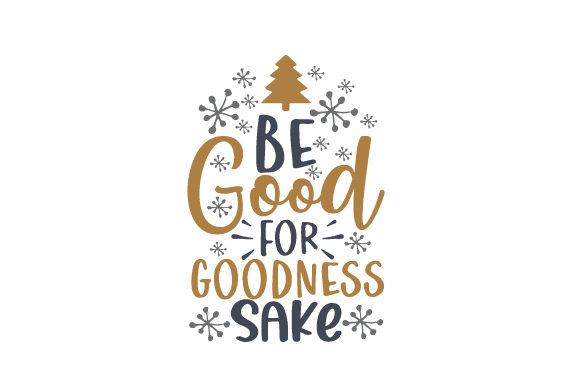
Such an odd phrase! It seems to have a strange origin and stranger application. While the phrase “for goodness sake” is part of a translation of Plato’s Republic, it lives on in various places, including some Christmas songs to remind us of the quasi-omniscience of St. Nick. But then, as now, it serves very little value in producing Goodness. It is simply an exclamation to add flavor to an appeal. “For goodness sake, women, bring me another Oreo!” But the phrase raises some interesting questions. If you have a minute, let’s explore them.
The idea of Goodness implies a contrast to something else – Badness! And when you have a set of terms that create opposites, you must also have a standard that can be used to assess the amount or intensity of either extreme.
- Is this thing Good or Bad?
- Is this thing more Good than the other thing?
- How Bad is this thing really, compared to another Bad thing?
- If I do a Bad thing so I can do a Good thing, is that good?
These hard questions must be considered when we talk about Goodness and Badness, or Rightness and Wrongness. Since analogies are Good, let’s play with one:

It is cold outside! But who determines this coldness? In this example, I do! I think it is cold. I think this because of some standard that I use to make this determination. It is cold because I am used to something warmer. It is the middle of summer and it is 72°. If I say it is cold then it is because I am used to or expect it to be 85°. Let us jump forward 6 months to winter. How ridiculous would I sound if I still said 72° was cold? But wait! This winter I took a vacation to the Bahamas so 72° is still cold.
Do you see the problem? The standard keeps changing. You want more ambiguity? Ask my wife! She will tell you that 85° requires a jacket, blanket or fireplace…no matter what season or county. The only time we will get full agreement on this ever-shifting scale is in the extremes. No one will argue that 72° below zero isn’t cold. Equally, no one will argue that 105° isn’t hot – unless we are talking about your soup or coffee, that is only tepid. Darn it! There is that shifting standard again!
If we want to have a serious conversation about the coldness or hotness of something we have to start by applying a set of standards. As long as don’t argue over Celsius or Fahrenheit, we at least have a common starting point.
So here you have it. This is our world. We have a habit of applying the standard of our choice to the world around us. Miles vs Kilometers. Pounds vs Kilograms. IQ vs EQ. The variables of what is hot & cold, tall & short, smart & ah…not-smart are subject to preference and malleable constructs. Since this is how we approach nearly everything in our day-to-day life, it makes sense that we would keep this Play Dough view of good and bad…of right and wrong. Both “concepts”, goodness and badness, have been molded like putty into the image of our own experience or opinion. This has become so common; our language has changed to include moral ambiguous phrases like “What is your Truth?” Or “You do you and I will do me!”
With this approach to a critically important moral scale, I am now able to easily tell you that I am Good or that I am even better than you. Actually, I am thankful that I am not like that sinner over there! Sound familiar? This fuzzy moral code is not new. I would argue that it goes all the way back to the original Scale-shifter. The serpent simply said, “Did God really say that?” Question the standard and the next easy step is to create a new standard. So what standard should we use to assess Goodness? I thought you would never ask!
Jesus had a thing or two to say about Goodness. When He was approached by the Rich young Ruler (Luke 18:18) “Good Teacher, what must I do to inherit eternal life?”, Jesus responded, “Why do you call me good? No one is good except God.”
Was this a reprimand for calling Him good? Absolutely not! It was an affirmation of His deity! Jesus was drawing out the unknowing truth of what the man had said. “I am God; therefore, I am Good – you have rightly said!”
This simple question/statement by Jesus solves our Shifting Scale problem. WE are not the standard of Goodness. Billy Graham, Mother Teresa are not the standard! Jesus is the standard. Jesus is God; Jesus is Good; no other. If Paul says that part of the Fruit of the Spirit is Goodness, he is telling us to be like Jesus, not better than our neighbor; not better than a convict.
A final thought: Since Goodness is really all about Who God is and His character, it makes sense that Goodness is actually derived from Godliness and Godliness is really God-Likeness? That means we are only showing goodness when we are acting like God. This would be an impossible task if it wasn’t for the fact that God says we are to be like Him. He commands it! If He gave the command, there must be a way to begin moving in the direction of becoming good. This is the point of listing the Fruit of the Spirit. And since these are His fruits, He can help us bear them. We don’t and can’t be Good on our own. That would produce Pride, a fruit of the flesh.
This brings us to a quick practical step that we can take to develop Goodness. We should begin every thought and every action with the question, “What would Jesus do?” Don’t know the answer? Get into the Word and learn how to be Good for Goodness Sake!
OPEN MIC: SHARE YOUR THOUGHTS
- What are some examples of when you thought you were being Good but it was really motivated by a self-focused agenda?
- What are some examples of seeing others showing Goodness, like Christ?
-Michael G
Further reading: Fruit of the Spirit

